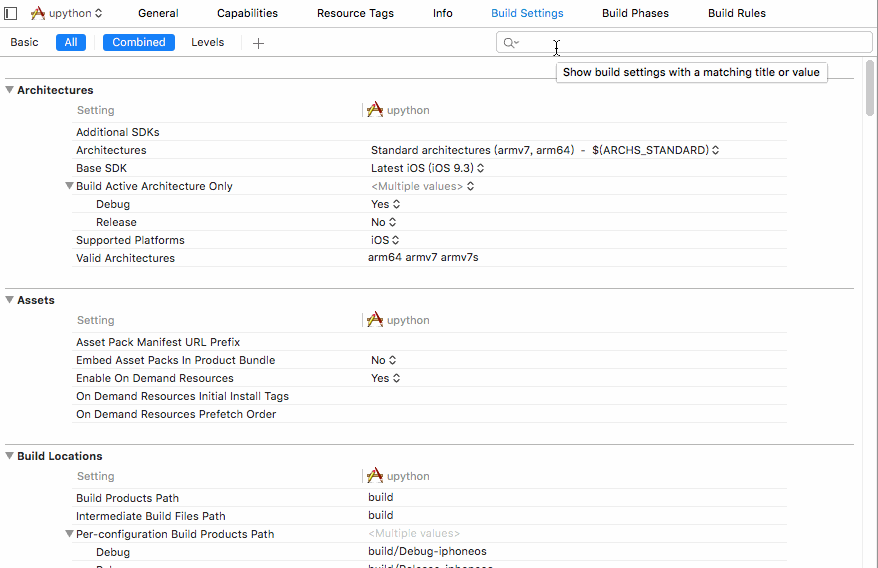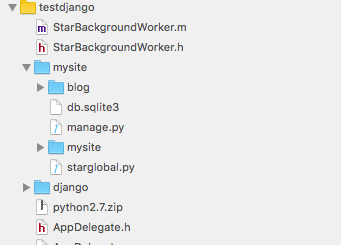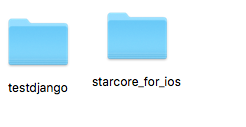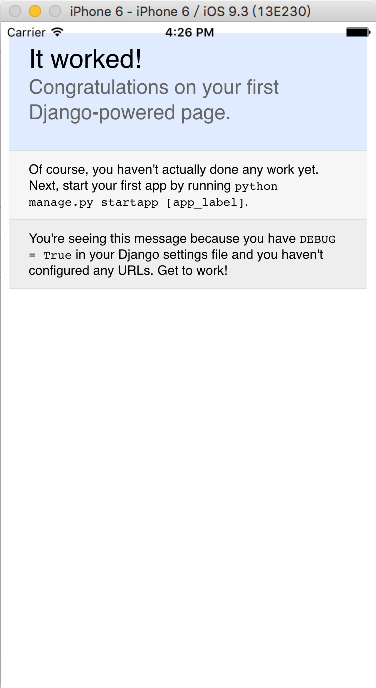Django is python's web framework, which can be used to build websites or as a backstage for web applications. Usually Django is started from the command line. Using DJango in ios needs to start from the program through code. In addition, DJango needs a certain time to start. After starting, it needs to notify the interface thread.
1. Install Django in desktop python, create ios project, and then add Django module to ios application project.
Adding python and cle-related libraries, django uses hashlib and needs to add ssl-related libraries, libssl and libcrypto.

Set the search path of the project's environment variables, header files or libraries:

Add django on the desktop and mysite created to the project

2. Modify manager.py and runserver.py
To notify the calling process after initialization is complete, you need to modify runserver.py (in the core management commands directory)
def inner_run(self, *args, **options):
…
try:
import starglobal
starglobal.MainActivity.OnDJangoInitFinish() # notify host
handler = self.get_handler(*args, **options)
run(self.addr, int(self.port), handler,
ipv6=self.use_ipv6, threading=threading)
starglobal is an empty module that manages global variables. To notify the calling thread, MainActivity.OnDJangoInitFinish is called before run ning. MainActivity is a shared object set by the calling thread and accessed in python.
manager.py is usually loaded from the command line, so if it is loaded from the code, some modifications are needed. After modification, the code is as follows:
#!/usr/bin/env python
import os
import sys
import traceback
import thread
import time
def doit(val):
os.environ.setdefault("DJANGO_SETTINGS_MODULE", "mysite.settings")
try:
from django.core.management import execute_from_command_line
except ImportError:
# The above import may fail for some other reason. Ensure that the
# issue is really that Django is missing to avoid masking other
# exceptions on Python 2.
try:
import django
except ImportError:
traceback.print_exc()
raise ImportError(
"Couldn't import Django. Are you sure it's installed and "
"available on your PYTHONPATH environment variable? Did you "
"forget to activate a virtual environment?"
)
raise
execute_from_command_line(['manage.py', 'runserver','--noreload'])
if __name__ == "__main__":
try:
print(MainActivityClass)
import starglobal
starglobal.MainActivity = MainActivityClass()
print(starglobal.MainActivity)
thread.start_new_thread(doit,(0,))
while True :
while libstarpy._SRPDispatch(False) == True :
pass
libstarpy._SRPUnLock()
time.sleep(0.01)
libstarpy._SRPLock()
except Exception :
traceback.print_exc()
3. Initialize python, set MainActivityClass, and load manager.py.
extern "C" void init_hashlib(void);
NSString *respaths = [[NSBundle mainBundle] resourcePath];
const VS_CHAR *res_cpath = [respaths UTF8String];
VS_CHAR python_path[512];
VS_CHAR python_home[512];
sprintf(python_home,"%s/python",res_cpath);
sprintf(python_path,"%s/python2.7.zip",res_cpath);
VSImportPythonCModuleDef CModuleDef[]={{"_hashlib",(void*)init_hashlib},{NULL,NULL}};
VSCoreLib_InitPython((VS_CHAR*)python_home,(VS_CHAR *)python_path,CModuleDef);
void *python = SRPInterface ->ImportRawContext((VS_CHAR*)"python",(VS_CHAR*)"",false,NULL);
void *pythonsys = (void *)SRPInterface->ScriptGetObject(python, "sys", NULL);
void *pythonpath = (void*)SRPInterface->ScriptGetObject(pythonsys, "path", NULL);
SRPInterface->ScriptCall(pythonpath, NULL, "insert", "(is)",0,res_cpath);
sprintf(python_path,"%s/mysite",res_cpath);
SRPInterface->ScriptCall(pythonpath, NULL, "insert", "(is)",0,python_path);
Star_ObjectCBridge_Init(SRPInterface,NULL,NULL);
/*---need include --#import <objc/runtime.h>-*/
/*--there is a bug of cle 2.5.1 for set object to cle, which will be solved at 2.5.2-*/
/*SRPInterface -> ScriptSetObject(python,"MainActivity",VSTYPE_OBJPTR,(VS_UWORD)_FromObjectC(self));*/
SRPInterface -> ScriptSetObject(python,"MainActivityClass",VSTYPE_OBJPTR,(VS_UWORD)_FromObjectC(objc_getClass("MainActivityClass")));
sprintf(python_path,"%s/mysite/manage.py",res_cpath);
SRPInterface->DoFile("python", python_path, NULL, NULL, VS_TRUE);
@interface MainActivityClass : NSObject
-(void)OnDJangoInitFinish;
@end
@implementation MainActivityClass
-(void)OnDJangoInitFinish
{
dispatch_async(dispatch_get_main_queue(),^{
[Control.MyBrowser loadRequest:[NSURLRequest requestWithURL:[NSURL URLWithString:@"http://127.0.0.1:8000"]]];
});
}
@end
4. Running results and code download

